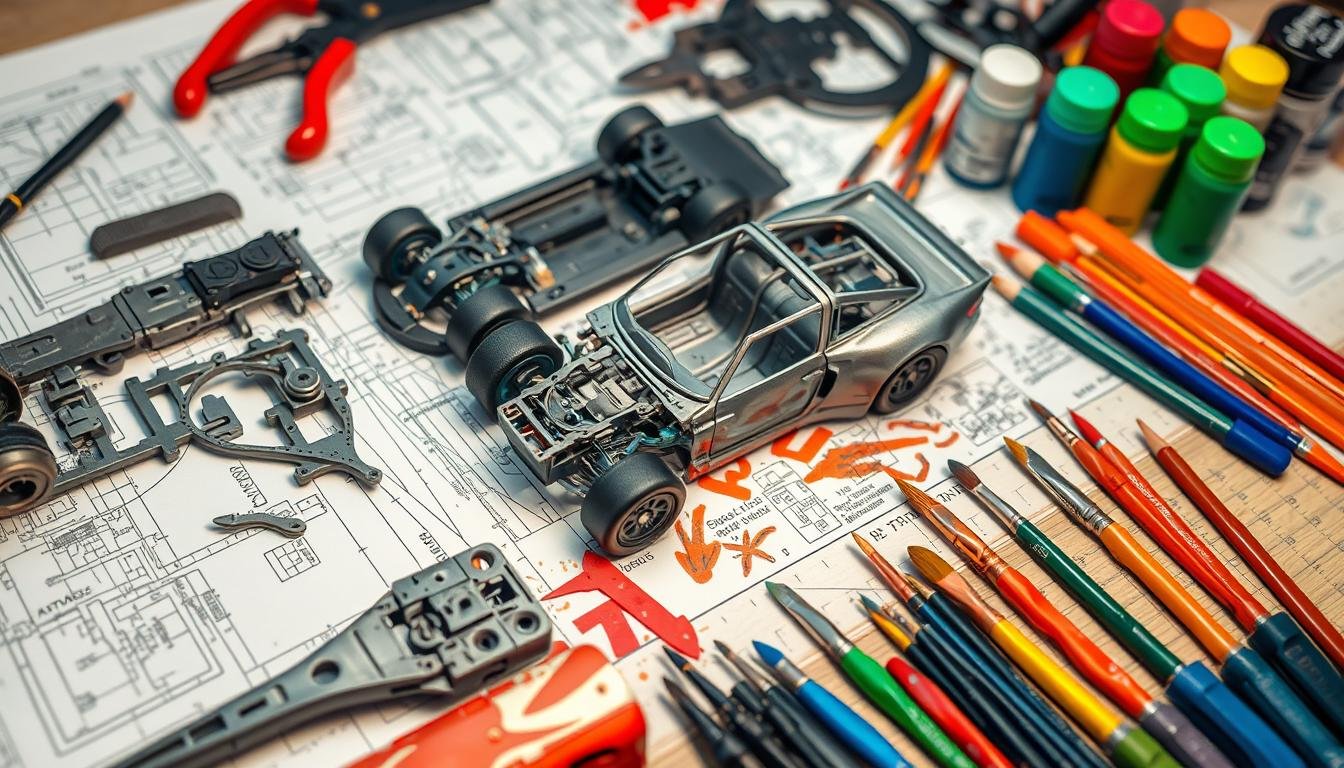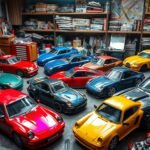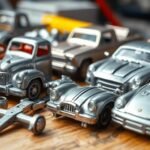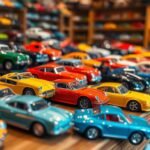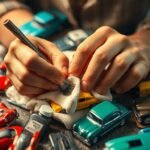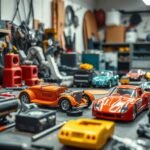Diecast model making has captivated millions worldwide. This hobby blends artistry and engineering, appealing to enthusiasts of all ages. Ready to explore this fascinating world of miniature vehicles?
Diecast models are high-quality replicas made from metal alloys and plastic. They come in various scales like 1:43, 1:24, and 1:181. These intricate pieces use zinc and aluminum alloys for strength.
Plastic forms detailed parts, while rubber provides wheel traction1. This guide will help you make diecast models, covering everything from disassembly to custom modifications.
Diecast model kits offer endless creative possibilities. With patience and proper techniques, you can create stunning masterpieces2. This tutorial covers essential tools, materials, and step-by-step assembly instructions.
You’ll gain a solid foundation to start your modeling journey. Get ready to transform basic kits into unique works of art.
Key Takeaways
- Diecast modeling is a popular hobby with millions of enthusiasts worldwide
- Models are made from metal alloys, plastic, and rubber
- Various scales are available, including 1:43, 1:24, and 1:18
- Patience and attention to detail are crucial for successful model making
- Custom modifications can transform basic kits into unique creations
- Proper tools and techniques are essential for quality results
Essential Tools and Materials for Diecast Model Making
Diecast model customization needs a well-equipped toolkit. Each item is crucial for creating miniature masterpieces. From basic assembly tools to specialized painting supplies, you’ll need various items.
Basic Tool Requirements for Model Assembly
Side cutters are vital for removing parts from sprues. Craft knives help trim parts and decals3. Abrasives like metal needle files and sanding sticks smooth surfaces and tidy up parts3.
Recommended Adhesives and Bonding Materials
Choosing the right adhesive is key for diecast model detailing. Poly cement is essential, with options for larger and delicate pieces3. Use specialized glues like Revell Contacta Clear for clear parts3.
Paint and Finishing Supplies
Water-based acrylic paints are ideal for diecast models. They dry quickly and clean up easily3. Get quality brushes of various sizes and shapes.
For a professional finish, try using an airbrush and compressor3.
| Tool | Purpose | Recommended Type |
|---|---|---|
| Sandpaper | Surface smoothing | 400-1000 grit4 |
| Glue | Part assembly | Poly cement, cyanoacrylate3 |
| Paint | Model coloring | Water-based acrylics3 |
Safety Equipment and Workspace Setup
Your workspace needs good ventilation, a flat surface, and proper lighting. Don’t forget safety gear like gloves and protective eyewear. Organize small parts in zip-top bags.
Use cotton swabs for cleaning hard-to-reach areas4. With these tools and setup, you’re ready to explore diecast model making.
How to Make Diecast Models: Detailed Assembly Process
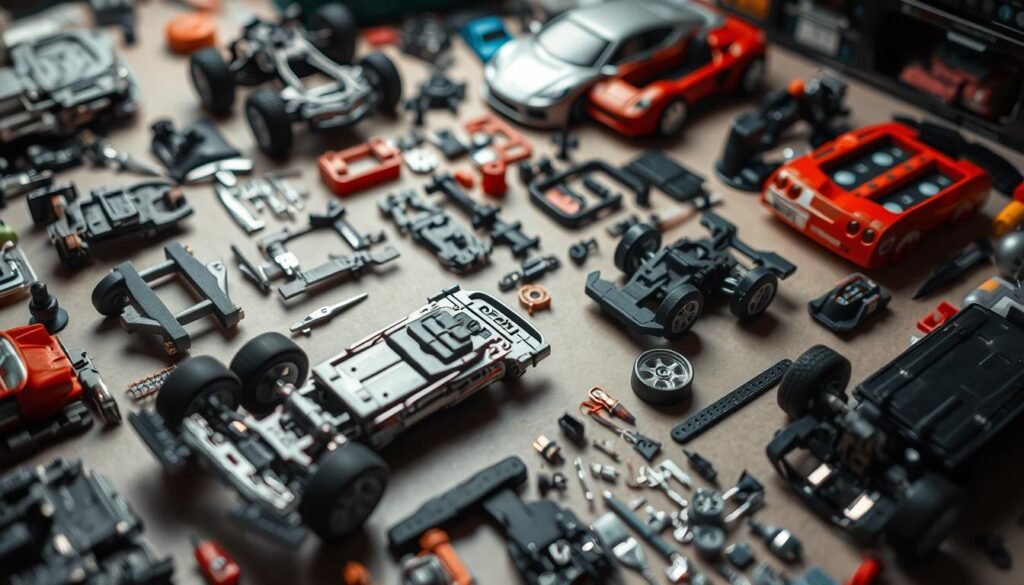
Diecast model collecting blends precision and artistry. The assembly process reflects rich history and expert craftsmanship. Let’s explore creating your own diecast masterpiece.
Disassembling the Model Components
Examine your kit carefully. Spread out all parts and check them against the instruction manual. The casing is usually the only diecast part.
Hundreds of other pieces are made through plastic injection5. This step helps understand the model’s structure and plan your assembly.
Surface Preparation and Cleaning
Proper prep ensures a flawless finish. Remove mold lines using fine files or emery boards. Sand surfaces progressively, from coarse to fine grits.
Clean all parts with warm, soapy water. This removes mold release agents and oils. Good preparation guarantees paint adhesion and a pro look.
Priming and Painting Techniques
Priming is key for smooth paint application. Use an airbrush or spray can for an even coat. Apply multiple thin paint layers, letting each dry.
A spray stand helps achieve even coverage. Manufacturers’ pad machines apply one color at a time, so be patient5.
Custom Modifications and Detailing
This stage allows for personalization. Add decals, modify parts, or create unique paint schemes. High-quality models use separate molds for lights.
Vacuum forming creates clear glass pieces. This mimics techniques used by professional manufacturers.
Final Assembly and Quality Check
Assembly requires intense labor. Follow kit instructions carefully, using proper adhesives for different materials. Take your time for precision.
Pro settings pass models through many hands. Some use conveyor belts for efficiency65.
“The joy of diecast model collecting lies not just in the finished product, but in the journey of creation itself.”
| Assembly Method | Production Volume | Efficiency |
|---|---|---|
| Movable Assembly Line | Large | High |
| Tray System | Medium | Medium |
| Single Station | Limited | Low |
These steps deepen your appreciation for diecast model craftsmanship. Pro makers inspect all models before shipping7. Apply this same care to your creation.
Check every detail against your high standards. Your finished model will showcase your skill and dedication.
Conclusion
Diecast model making blends creativity and precision into a rewarding hobby. The craft has evolved from early 20th-century lead toys to intricate collectibles8. When starting your collection, think about your preferred scale and model types.
Top manufacturers like AUTOart, Bburago, and Minichamps offer diverse options. Custom diecast cars allow collectors to express their creativity freely. Essential tools include paintbrushes, airbrush kits, and detailing equipment.
Customization involves disassembling, prepping surfaces, painting, and reassembling8. Pricing custom models should factor in kit cost, supplies, complexity, and shipping. Builders typically spend about $8 on supplies per model.
Complex kits may need a 50% add-on to the base cost9. The diecast model collecting future looks promising, with enthusiasts showcasing incredible creativity and craftsmanship8.
Accurate cost estimation is vital for hobbyists and profit-seekers alike. Provide precise shipping calculations and offer refunds for overcharges to impress clients9. With dedication and practice, you’ll create stunning miniatures that last for years.
FAQ
What are the most common scales for diecast models?
What materials are typically used in diecast model making?
What essential tools do I need to start making diecast models?
How do I prepare the surface of a diecast model before painting?
What type of paint should I use for diecast models?
How can I customize my diecast model?
What safety precautions should I take when making diecast models?
How long does the diecast model making process typically take?
What are some reputable diecast model manufacturers?
How did diecast modeling originate?
Source Links
- How are diecast models made? – https://minimodelshop.com/blog/mini-models-how-are-diecast-models-made?srsltid=AfmBOorOrGsW3TzMevnTnDtxOnYy8ME4nrf5kuG_xKdb_VcZ1-nAT-td
- How to make a 1/24 custom start to finish – https://www.diecastcrazy.com/threads/how-to-make-a-1-24-custom-start-to-finish.88775/
- A Buyer’s Guide to Tools for Model Making | Get Started with Paints, Tools & Materials – https://www.wonderlandmodels.com/get-started/paints-tools-materials/a-buyers-guide-to-tools-for-model-making/
- Supplies & Tools for Building Model Cars – https://www.autoworldstore.com/blogs/tips-tricks/top-scale-model-car-supplies?srsltid=AfmBOoopvK63fa5JeNbd8HqohHfjRFP2fd0LFzrfWumUp68Ec1iaM2Ar
- The Manufacturing Process: How Are Diecast Model Cars Made? – https://livecarmodel.com/blog/the-manufacturing-process-how-are-diecast-model-cars-made/?srsltid=AfmBOoqLfoU23030fNHo2d2NaowtsEeWhPFH7u-vGAWaGhqeNJC8g5Zo
- DIECAST MODEL FINAL ASSEMBLY LINE! — How Are Diecast Cars & Trucks Made — Part 7 – https://medium.com/toy-talk/diecast-model-final-assembly-line-how-are-diecast-cars-trucks-made-part-7-cb6bc446d3d9
- Behind the Scenes: The Making of Diecast Models – https://explorafind.com/blogs/news/behind-the-scenes-the-making-of-diecast-models
- From Hobby to Art: The Fascinating World of Custom Diecast Cars – https://medium.com/@rapidvehicles2023/from-hobby-to-art-the-fascinating-world-of-custom-diecast-cars-1c4bff8f0c11
- So You Want To Do Commission Build Models? – JonBius.com – https://www.jonbius.com/2020/03/27/so-you-want-to-do-commission-build-models/

